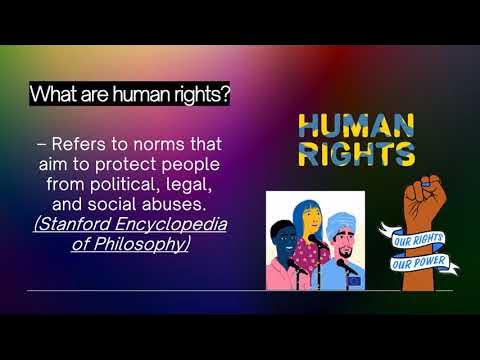Principles of Human Rights
Summary
TLDRThis video script delves into the concept of human rights, defining them as inalienable, fundamental rights inherent to all individuals. It emphasizes the intrinsic value of human dignity and worth, illustrating the interconnectedness of rights through the metaphor of 'Wright's soup' supported by three foundational stones: universality, inalienability, and indivisibility. The script promises a deeper exploration of these principles and their historical development in subsequent videos.
Takeaways
- 📝 Human rights are defined as inalienable, fundamental rights that every person is inherently entitled to by virtue of being human.
- 🔒 'Inalienable' means that human rights cannot be taken away from an individual, signifying their inherent nature.
- 🌱 'Fundamental' refers to the basic rights that form the foundation for other rights and are essential to human dignity and worth.
- 🌟 'Inherently' indicates that human rights are a natural part of being human, not granted by any external authority but rather an intrinsic aspect of humanity.
- 🏷 'Entitled to' implies that these rights are owed to every individual simply for being human, and are not conditional or discretionary.
- 💡 The concept of human rights is rooted in the ideas of dignity and worth, emphasizing the value of individuals and their right to live a dignified life.
- 🌐 'Universality' of human rights means that they apply to all people regardless of any differences, suggesting a connection to natural law.
- 🔒 'Inalienable' nature of human rights is reiterated, emphasizing that no situation can justify the removal of these fundamental rights.
- 🔗 'Indivisible' highlights the interconnectedness of human rights, indicating that the violation of one right impacts the integrity of all others.
- 🔍 The script introduces the foundational stones of human rights with an analogy of a cooking pot supported by three stones, representing universality, inalienability, and indivisibility.
- 📚 The video promises a deeper discussion and historical context on human rights in the subsequent video, indicating a continuation of the topic.
Q & A
What does the term 'inalienable' mean in the context of human rights?
-In the context of human rights, 'inalienable' means that the rights cannot be taken away from a person. They are inherent and belong to an individual simply by virtue of being human.
What is the significance of 'fundamental rights' in the definition of human rights?
-Fundamental rights are basic rights that form the basis for other rights and are essential for a person's dignity and existence. They are the foundational stones upon which other rights are built.
What does the term 'inherently entitled' imply about human rights?
-'Inherently entitled' implies that every person has a natural and essential claim to these rights by the mere fact of being human, without the need for any external grant or condition.
How does the concept of 'dignity' relate to human rights?
-Dignity is a foundational idea behind human rights, suggesting that every individual has an inherent worth and should be treated with respect, which is reflected in their rights to live a dignified life.
What is the foundational idea of 'worth' in the context of human rights?
-The foundational idea of 'worth' in human rights refers to the intrinsic value of every individual, which justifies their entitlement to rights and the recognition of their importance in society.
Can you explain the African proverb 'two stones cannot support a cooking pot' in relation to human rights?
-The African proverb 'two stones cannot support a cooking pot' is used to illustrate the concept that human rights are interdependent and interconnected. Just as a pot needs more than two stones to be stable, human rights need all three foundational aspects—universality, inalienability, and indivisibility—to be upheld effectively.
What does 'universality' of human rights mean?
-Universality of human rights means that these rights apply to every person, regardless of their nationality, ethnicity, religion, or any other status. It emphasizes that human rights are a common standard for all humanity.
What is the concept of 'indivisibility' in the context of human rights?
-Indivisibility in the context of human rights means that all rights are interconnected and interdependent. If one right is violated, it can affect the enjoyment of other rights, emphasizing the need to protect and uphold all rights together.
Why is it said that human rights 'trump other priorities'?
-Human rights are said to 'trump other priorities' because they are considered inherently more valuable and cannot be overridden by other considerations. This highlights the fundamental importance of human rights in all situations.
What is the significance of the 'Wright's soup' illustration in explaining human rights?
-The 'Wright's soup' illustration is used to visually represent the three foundational aspects of human rights—universality, inalienability, and indivisibility—as the three stones supporting a cooking pot. It shows that like the stones, all three aspects are necessary to maintain the stability and integrity of human rights.
What is the historical context that will be discussed in the next video regarding human rights?
-The next video will delve into the historical development and evolution of the understanding of human rights, exploring how societies and global institutions have come to recognize and define these fundamental rights over time.
Outlines

此内容仅限付费用户访问。 请升级后访问。
立即升级Mindmap

此内容仅限付费用户访问。 请升级后访问。
立即升级Keywords

此内容仅限付费用户访问。 请升级后访问。
立即升级Highlights

此内容仅限付费用户访问。 请升级后访问。
立即升级Transcripts

此内容仅限付费用户访问。 请升级后访问。
立即升级浏览更多相关视频

What is Constitution? | Ano Ang Konstitusyon? | Constitution Defined | Filipino English Video |

Libertarianism Explained: What Are Rights? - Learn Liberty

Peace and Human Rights Concepts

Mengenal Konvensi Hak Anak

Materi PKn Kelas 11 Harmonisasi Hak Asasi dan Kewajiban Asasi Manusia Dalam Perspektif Pancasila (1)

The Story of Human Rights
5.0 / 5 (0 votes)
